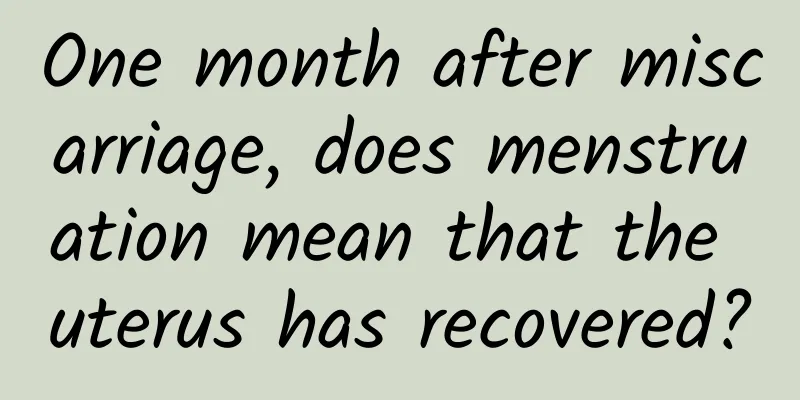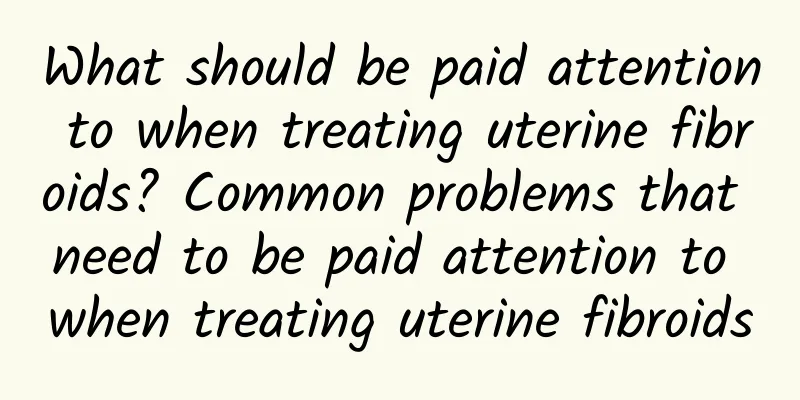One month after miscarriage, does menstruation mean that the uterus has recovered?

|
One month after miscarriage, does menstruation mean that the uterus has recovered? Whether menstruation one month after miscarriage means that the uterus has recovered needs to be judged based on the specific circumstances. Abortion means that the embryo or fetus has no ability to survive and the pregnancy is terminated. Abortion can cause damage to the endometrium, cervix, etc. If you have menstruation one month after abortion, the menstrual flow is normal, the menstrual period is 3-7 days, and there are no other abnormal reactions, it usually indicates that the uterus has recovered. However, if you have menstruation one month after abortion, and there are abnormal reactions such as heavy menstrual flow, long menstrual period, or too little menstrual flow, short menstrual period, etc., it usually indicates that the uterus has not recovered. Menstruation one month after abortion may also be related to factors such as incomplete abortion, infection, threatened abortion, etc., as follows: 1. Incomplete abortion If an incomplete abortion occurs, the residual tissue of pregnancy remains in the uterine cavity after the abortion, which can lead to poor uterine involution and vaginal bleeding. If you don't know, you would think it is menstruation. 2. Infection Abortion can cause damage to the endometrium, cervix, etc. If you do not pay attention to self-care after abortion, it may induce infection and may cause irregular uterine bleeding, which may be mistaken for menstruation. 3. Threatened abortion If you have unprotected sex within one month of a miscarriage, are already pregnant, do not take good care of yourself after pregnancy or do strenuous exercise, leading to threatened miscarriage, vaginal bleeding will occur, which may be mistaken for menstruation. In addition to the above common factors, factors such as cervical polyps, uterine fibroids, and ectopic pregnancy should also be considered. Abortion patients need to go to regular hospitals and maintain good living habits after abortion, such as paying attention to perineum hygiene, regular work and rest, and balanced nutrition as much as possible. Usually, the patient's body can recover after a period of time, so they should maintain a good attitude every day and avoid excessive tension and anxiety. |
>>: New dietary goals for hyperprolactinemia
Recommend
How to treat endometrial tuberculosis and its corresponding costs
Endometrial tuberculosis troubles the health of m...
Symptoms and treatment of ectopic pregnancy
What are the symptoms of ectopic pregnancy? What ...
Is cervical cyst a uterine fibroid?
Is cervical nabothian cyst a uterine fibroid? Cer...
What are the early symptoms of cervical warts?
People are not unfamiliar with cervical genital w...
How to treat pregnancy complicated with uterine fibroids? What are the treatments for pregnancy complicated with uterine fibroids?
The situations of patients with uterine fibroids ...
Experts teach you how to correctly identify chronic adnexitis
Clinically, due to the slow onset of chronic adne...
What complications may occur after abortion? How to deal with them?
Do you know that artificial abortion, also known ...
Adnexitis can be diagnosed based on the patient's lower abdominal pain.
Lower abdominal pain is a typical symptom of adne...
What is wrong with postmenopausal bleeding? What should I do?
What is wrong with postmenopausal bleeding? What ...
Is irregular menstruation hereditary?
Is irregular menstruation hereditary? Irregular m...
How to treat abnormal vaginal discharge? Choose between Western medicine and traditional Chinese medicine
If you have abnormal leucorrhea, you can choose b...
Drink lemon water without getting sick? Can I drink it every day? Nutritionist Cai Yusi breaks down 4 myths about lemonade
Although lemons are small, they have big health b...
The endometrium is too thin, what are the hazards to women preparing for pregnancy
We all know that only a healthy uterus can give b...
Treatment methods for irregular menstruation in patients with different constitutions
Menstruation is a normal physiological phenomenon...
How to treat threatened abortion
How to treat threatened miscarriage? If there is ...









